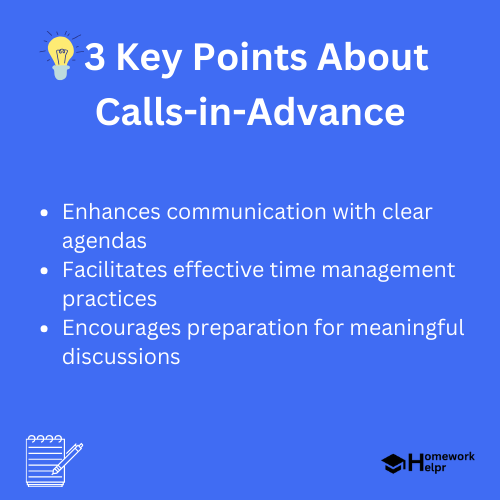📝 Summary
Calls-in-Advance are a vital strategy in today’s communication landscape, allowing individuals and businesses to schedule phone calls or meetings prior to the actual conversations. This method enhances time management, promotes effective communication, and allows participants to prepare adequately for discussions. Key steps for effectively implementing Calls-in-Advance include choosing a suitable time, outlining the purpose, and utilizing tools for reminders. While there are various applications such as in business meetings, personal conversations, and during sales, challenges like time zones and last-minute changes can arise. Overall, these proactive scheduling techniques can lead to more productive dialogues and stronger relationships.
Understanding Calls-in-Advance
In today’s competitive world, effective communication is more critical than ever. Calls-in-advance represent an essential strategy that businesses and individuals use to ensure that conversations or meetings occur at a scheduled time. This article will delve into what Calls-in-Advance are, their importance, applications, and how to effectively implement them.
What are Calls-in-Advance?
Calls-in-advance refer to the practice of scheduling a telephone call or meeting prior to the actual conversation. This can involve notifying the other party about the intent to call at a specific time. It is a way of organizing and managing time efficiently.
When conducting calls-in-advance, one typically communicates not just the time but also the purpose of the upcoming conversation. This practice eliminates uncertainty and ensures that both parties are prepared for the discussion.
Definition
- Scheduling
- The action of arranging a time for an event, meeting, or conversation.
- Efficiency
- The ability to accomplish a task with minimum wasted time and effort.
Importance of Calls-in-Advance
The significance of Calls-in-Advance cannot be overstated. Here are some key reasons why they are crucial:
- Improved Communication: These calls foster better communication as both parties are aware of the agenda.
- Time Management: Scheduling calls helps in managing one‚’ time effectively, leading to higher productivity.
- Preparation: It gives individuals the chance to prepare their thoughts or gather necessary documents before the discussion.
When people know they will be discussing specific topics, they can formulate their questions and concerns in advance, leading to meaningful and productive conversations.
How to Schedule Calls-in-Advance
Effectively scheduling Calls-in-Advance requires a few simple steps:
- Choose the Right Time: Assess the availability of the person you aim to contact before proposing a time.
- Provide a Purpose: Clearly outline why you want to call. This allows the recipient to prepare accordingly.
- Use Tools: Utilize calendar applications to send meeting requests or reminders for the upcoming call.
Taking these steps shows respect for the other person’s time and can positively influence the outcome of the conversation.

Best Practices for Effective Calls-in-Advance
To harness the full potential of Calls-in-Advance, here are some best practices:
- Follow-Up: Confirm the scheduled call before the meeting day to ensure that the other party remembers.
- Be Punctual: Always start the call on time; this demonstrates professionalism and regard for the other person‚’ time.
- Stay Focused: Stick to the agenda during the conversation to cover all necessary topics efficiently.
These best practices contribute to an effective communications strategy, allowing for more meaningful and productive conversations.
Variations of Calls-in-Advance
There are different scenarios where Calls-in-Advance can be utilized:
- Business Meetings: Corporate environments rely heavily on scheduled calls for project updates, strategy discussions, and decision-making.
- Personal Conversations: Friends and family can schedule calls to catch up and strengthen relationships.
- Sales and Client Relationships: In sales, calling clients in advance can lead to better rapport and more effective selling opportunities.
💡Did You Know?
Did you know that over 75% of users in corporate sectors agree that scheduling calls in advance makes communication much smoother?
Examples of Calls-in-Advance
Understanding the application of Calls-in-Advance through examples can enhance comprehension:
Example
First, a manager might send an email to their team stating, “I’d like to have a call tomorrow at 3 PM to discuss our quarterly targets. Please prepare your reports in advance.” This approach sets clear expectations and allows everyone to be prepared.
Example
Second, a business development officer reaching out to a potential client might say, “Can we schedule a call on Tuesday at 10 AM to discuss how our solutions can help your business?” This demonstrates interest and initiative, paving the way for a constructive dialogue.
Challenges of Calls-in-Advance
While Calls-in-Advance are generally beneficial, they also come with challenges:
- Time Zones: When individuals are in different time zones, scheduling calls can become complicated.
- Change of Plans: Last-minute changes might lead to missed calls, so flexibility is sometimes necessary.
- Lack of Response: Not everyone may respond promptly or engage with the scheduling request.
Being aware of these challenges can help in strategizing better communication methods effectively.
Conclusion
Calls-in-Advance are a valuable communication tool that can significantly improve both professional and personal interactions. By embracing proper scheduling techniques, understanding their importance, and implementing best practices, individuals can enhance their communication effectiveness. Whether it‚’ for business or casual conversations, taking a moment to plan ahead can lead to more productive discussions and stronger relationships.
Overall, as we navigate through our busy lives, remember that a little foresight in communication could lead to greater efficiency and connection with others.
Related Questions on Calls-in-Advance
What are Calls-in-Advance?
Answer: Calls-in-Advance are scheduled telephone calls or meetings arranged prior to the actual conversation to facilitate efficient communication.
Why are Calls-in-Advance important?
Answer: They improve communication, enhance time management, and allow participants to prepare for discussions.
How do I effectively schedule a Call-in-Advance?
Answer: Choose a suitable time, provide a clear purpose, and use tools like calendar apps for reminders.
What are some best practices for Calls-in-Advance?
Answer: Best practices include confirming the call, being punctual, and staying focused on the agenda during the conversation.
